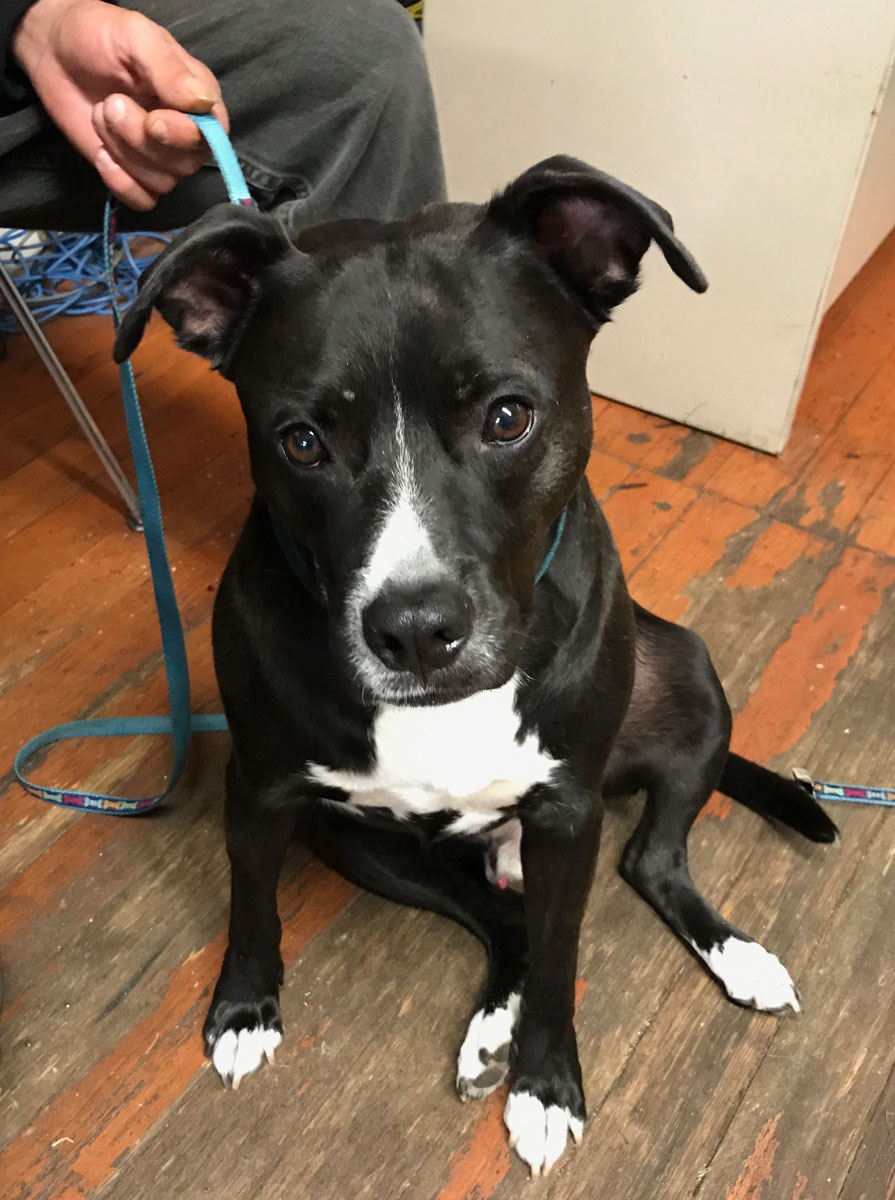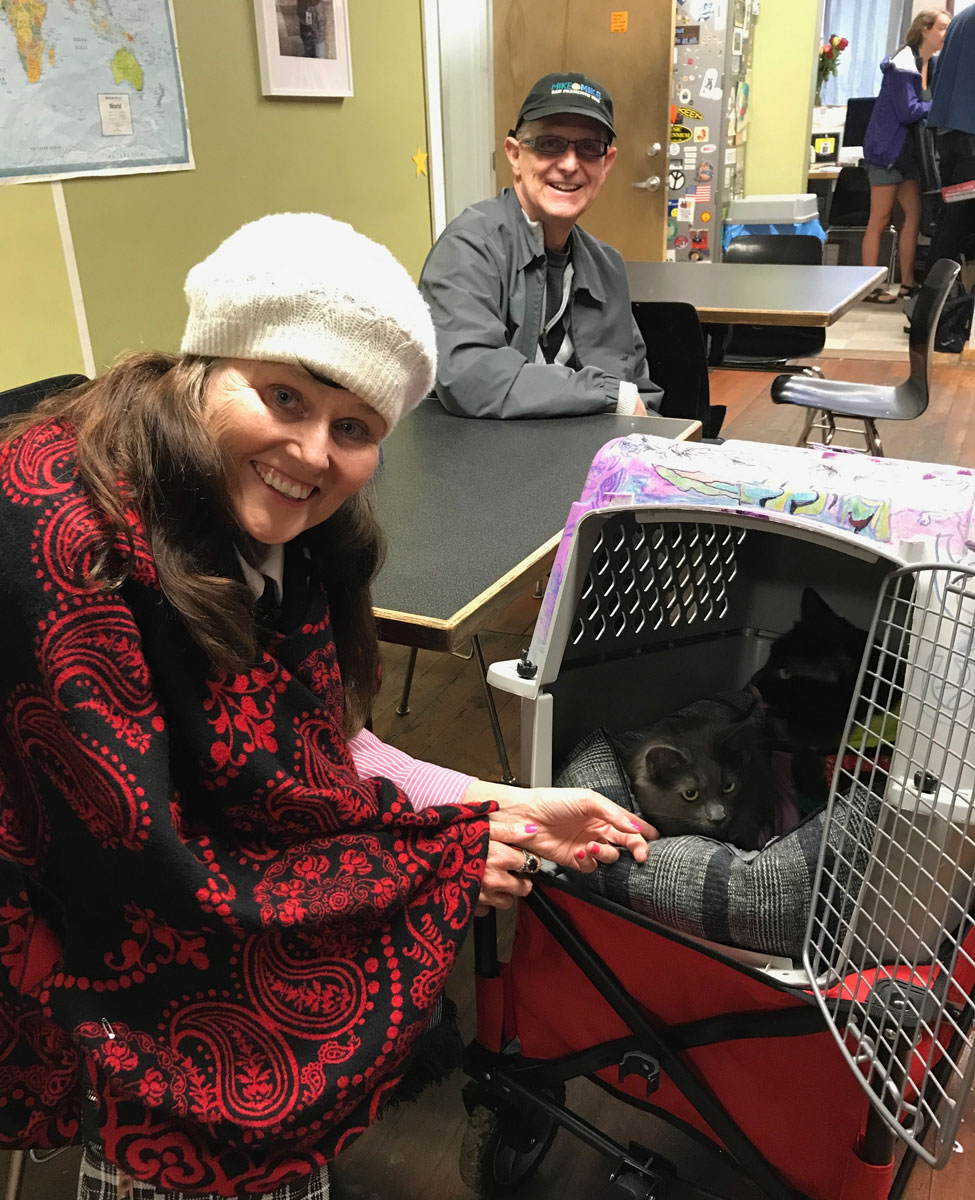Pets are always welcome at the Street Roots vendor office, but on this particular Wednesday at the close of business, the animals are taking over.
There’s a floofy black feline by the name of Mr. Beauregard wandering as far as his red leash will let him – much to the growling consternation of Dude, another black cat who is cocooned inside a blanket on a lap. Nearby, a dog named J.J. lolls on the floor, curious but unperturbed by the meows. Less impressed by all of this activity is Ms. Holly Jolly Hanesy – “Ms. H” for short – who chooses to keep her elegantly gray-furred self inside the red wagon-mounted carrier she shares with her more adventurous brother (who also goes by “Mr. B”).
The occasion is a Netflix screening of the British film “A Street Cat Named Bob,” which is based on the true story of James Bowen, a former vendor of the U.K. street newspaper The Big Issue, and Bob, who, well – is a cat. A pretty special cat, mind you. The full title of Bowen’s best-selling memoir about busking, homelessness, addiction and recovery was “A Street Cat Named Bob: And How He Saved My Life.” The little ginger fellow even plays himself, assisted by a half-dozen formally trained cats, while James is played by Luke Treadaway, who is also formally trained (he’s best known for his roles in the National Theatre productions of "War Horse" and "The Curious Incident of the Dog in Night-Time").

Our animal menagerie gathered around a computer monitor with their humans, all of whom are Street Roots vendors. Mr. B and Ms. H are kept in food and litter by Loretta Shirley Horn and her husband, Andy; the lap that Dude calls home belongs to Mistie Shaw, and J.J. can be found selling papers in the Pearl District with Rick Phillips.
A Street Cat Named Bob is a predictably feel-good movie that still has a bit of grit in its depiction of drugs, poverty, the street and social services. James is just coming out of homelessness and into subsidized housing and a methadone program when he meets the ragged, injured Bob, who turns up in his flat one night. “One night,” is also how long James swears the cat will stay, much to the amusement of the vendors watching the film.
“It always starts with one night!” Loretta said.
She and Andy were occasionally crashing at Loretta’s sister’s in California when they came upon an abandoned black cat who turned out to be pregnant. Mr. B and Ms. H were two of the kittens, and they spent the first months of their lives as van cats.
“Have you ever seen that shirt that said, ‘Who rescued whom?’” Loretta said. “That was us.”
The bond between James and Bob will be recognizable to any animal lover. One of the first things James has to do is take Bob to the vet, where he’s immediately faced with the choice of either paying for his own food or paying for the cat’s care. Whatever one’s job or housing situation, everyone with a pet can relate to that. In James’ case, he has nothing but a £20 note that his estranged father slipped him on the street. It goes to kitty antibiotics.
“It’s kind of cool that he’s like, ‘Oh, it’s not my cat, it’s not my cat,’ and then he’s like paying all these bills for the cat,” Mistie said. “I wish more people were like that. I think a lot of people find a stray cat or a homeless cat and they just automatically take them right to the pound.”
That’s where J.J. was, in California, where he would have been put down if he hadn’t found his way to Oregon as a second-chance dog.
“I got lucky,” said Rick, who lost his previous canine companion, Randy, in 2015. “He worked here too.”
Rick originally got Randy for emotional support after both his parents died, and he credits Randy and J.J. with keeping his life stable.
“I’ve lived in the same apartment for 12 years now,” he said. Before, "I’d only last two years. The dog keeps me out of trouble. If I were to go to jail or anything, I’d lose him.”
J.J. never barks, but he wants to be around his person 24 hours a day, and also wants constant petting, which Street Roots readers around Powell’s and Whole Foods are happy to provide.
“He’s part of the neighborhood,” Rick said. “If they’re having a bad day, it changes their day. People look forward to seeing him. I know some of my sales are more than they should be. They give me extra money: ‘This is for JJ!’ They buy him treats all the time.”
This phenomenon is also on display in “A Street Cat Named Bob.” When James began selling The Big Issue, customers would gravitate to Bob, as much for photos (with cameras, not smartphones; it was 2007) as to buy a paper. In the movie, this initially backfires on James, after a well-wisher insists on giving him money for a paper near another vendor’s “patch” (at Street Roots, it’s called “turf”). This gets James and Bob suspended for a month.
As the movie plays, Dude continues to hiss whenever Mr. B attempts to touch him, but it turns out his real nemesis is onscreen. Every time Bob meows in the movie, Dude lets out a fearsome noise, perhaps because he can’t see or smell this mysterious other creature.
“You know you’re yowling at a cat on the TV?” Mistie teased.
Mistie has hip dysplasia and often uses a motorized wheelchair or a walker. Just as Bob spent most of his time selling papers from James’ neck and shoulders, Dude stays close to her. “He loves riding on my chest,” she said. When she’s moving around town in the wheelchair, he gets strapped in on her lap.
Over the course of the film, Mistie and Loretta also exchange cat-on-a-leash tips, while Mistie wonders how James was able to get Bob to embrace a certain sartorial touch that would be just as appropriate in Portland as it is in London.
“I don’t know how he got his cat to wear scarves!” she said. “I’ve tried.”
Mistie and her husband are still going through what James did, battling to get drug-free, sheltered and employed. Like James and Bob in the movie, Mistie and Dude have also experienced judgmental pushback.
“They’re like, ‘Well, do you think it’s good to have him out here?,’ and I’m like, ‘What do you mean by that?’” Mistie said.
“And they’re like, ‘Well, you’re homeless.’ So? He wouldn’t rather be anywhere besides my lap.
“I feel like the houseless people treat their pets with more respect than anybody who has a house,” Mistie said. “People that live on the street spend damn near 24/7 with their pets. People who have a house, have a job, have so much stuff going on in their life, they maybe spend nine to 12 hours.”
Mistie’s first dollar selling papers always goes to Dude, and he knows it.
“First sale, he’s looking at me like, ‘OK, are we going to go get that food now?’” she said. They also rely on pet food banks like Pixie Project. The Sunday Potluck in the Park at O’Bryant Square provides feline vittles.
Before the move ends, Rick correctly predicts the final act: He figures that James gets clean, gets discovered, and then makes up with his family. The “discovery” comes via an article in The Big Issue and a meeting with some literary agents. Then, in the film’s climactic reconciliation scene, James’ father (played by "Buffy the Vampire Slayer’s" Anthony Head) refers to Bob as “my grandson.”
“Sweet,” Mistie said, while Loretta chuckles softly. She and Andy are not on speaking terms with one of their grown children, so it’s a moment that hits home.
In real life, Bowen has used his moment in the spotlight to promote the work of nonprofits, including street papers, for the work they did to support his recovery.
“What Bob the Cat did for James, he gave him hope, and family – a connection,” Loretta said. “And I think that’s what our cats have done for us. They have as much rescued us. They’ve given us a sense of joy. We’re a team.”
“It’s the best thing,” Rick said of animal companionship. “They need loving. I need loving. So it works out.”





